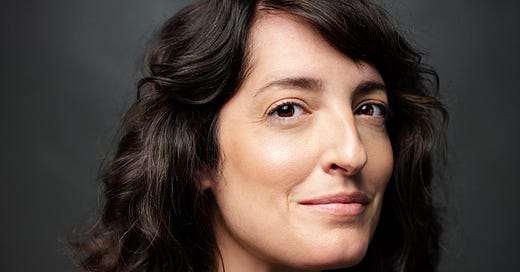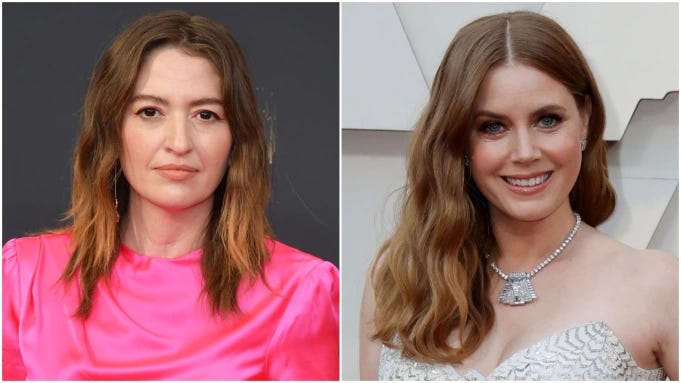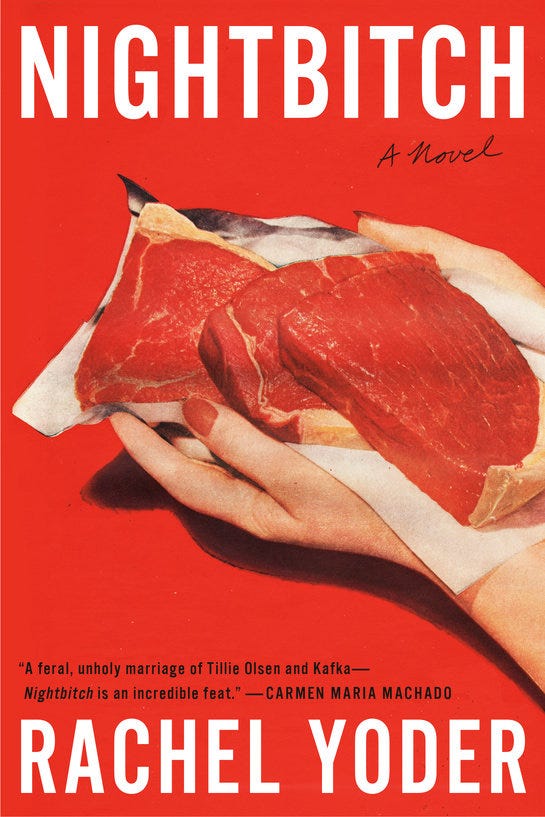Rachel Yoder: On art as exorcism, a midlife renaissance, and lack of community
Advice from the author of 'Nightbitch'
Meet our next creator, Rachel Yoder:
Rachel Yoder
Age: 44
Child: Coco, 8
Location: Iowa City, Iowa
Vocation: Author
Links: Rachel Yoder
I hope you all have the kind of friend who will surprise mail you a book that they know you need to read. That’s how Nightbitch came into my life. And it spoke to me in a way that few books ever have. Its author, Rachel Yoder, who is also a founding editor of draft: the journal of process, goes where so few have dared to go before: into the psychological realm of a mother during the first few years of her child’s life. Rachel is honest and visceral, and the result is a novel that feels part fable, part horror, in which an artist, who stopped making art to take care of her child, slowly morphs into a dog-like creature. It’s a magnificent feat and a must read. (And do it soon because they’re making a movie of it, directed by Marielle Heller and starring Amy Adams.)
Rachel takes the concept of transformation to the extreme in Nightbitch, but we all do transform in some way when we have children, and for many of us, it coincides with the start of middle age, another type of transformation, or at least transition, one which has been making headlines lately. Jessica Grose (her newsletter for the NYT is chockfull of goodness) recently published a big opinion piece that explores what it means to be a millennial and be middle-aged. The gist is that the trope of a midlife crisis, if it ever even really existed (except among some wealthy, white, hetero males), is mostly a thing of the past. “When you’re not financially stable until your mid-30s and you don’t have children until your late 30s,” Grose writes, “you don’t have the time or the funds to have a meltdown. You’re in a brand-new life stage that hasn’t yet had time to grow stale.”
This certainly feels like my experience. While our generation has struggled more financially than the most-previous ones, and while the hustle may be exhausting, it’s pretty energizing to be in a new stage, and working to figure that out, rather than dully coasting along in neutral. Nothing about it has the frivolity or self-sabotage of the stereotypical midlife crisis that we were fed growing up.
Rachel calls this time in her life a midlife renaissance, which I think describes what we are going through so much better. I have the pleasure of interviewing lots of middle-aged women, and what I see are women who spent their early adult years making their art, honing their skills, carving out their place in their field. I see women who had children in their mid-30s, more or less, and who are using that experience to feed their creative lives. They’ve been given a new way of moving through the world, of observing people, of reevaluating their own pasts. They are going through a renaissance because they get to do things like see the ocean for the first time, again, by seeing it through their child’s eyes. How could that not be rejuvenating? How could that not be inspiring? How could that not impact what art they can make?
There is no crisis in this scenario. If there’s a crisis happening at middle age, it’s a lack of affordable childcare. If there’s a crisis, it’s the underpayment of creative work. If there’s a crisis, it’s the lagging equality in relationships and persistent sexism in work environments. But despite these crises, we are still having a renaissance.
Now, Rachel, in her own words…
On the vision of motherhood differing from the reality:
Before I had my son, I had a ridiculous image of a perfectly egalitarian parenting situation in which my husband and I seamlessly and happily shared all responsibilities and both felt like we had enough time to also have careers and watch movies and participate in the things we each found meaningful apart from parenthood. And I just had no clue. Thinking about having another child now creates a flurry of anxiety and worry in a way I was not in touch with when I was pregnant the first time. I got a new job when I was on maternity leave running a fledgling literary nonprofit. And I thought, Yeah, I’ll have this awesome big job, I’ll have a baby, I’ll have a marriage, and this is what modern motherhood looks like. And it was a really rude awakening.
On losing your meaning:
A lot of the meaning in my life, before my son, came through writing. And through friendships. And when I had my child, I stopped writing and a lot of my friendships fell away for whatever reason. It was kind of a natural transition where a lot of my grad school friends were moving away, but your lifestyle changes when you have a kid. And even though my son brought this whole new facet to my life that made it incredibly meaningful, these other things had fallen away.
Almost all of the things that bring us meaning are, in a sense, kind of children. So when the actual child came into my life, he took over everything for a while, as a baby does, and it wasn’t until I woke up a couple years later, and I was like, Oh, all of my meaning is coming from this child, and it’s not enough. I need these other ways of making meaning in my life that had been fulfilling my identity before I was a mother and I had lost in early motherhood.
I did not think that I of all people would get sort of swallowed by motherhood. But I absolutely did. Writing, and writing Nightbitch in particular, was a road back to finding that self who had a meaningful life because she was a writer.
On getting the focus back:
I didn’t write for two years after my son was born, so I was pretty desperate to start writing again. I was really focused in a way I’d never been before when I finally got that three-hour or five-hour window. I did a thousand words. I made sure I wasn’t in the house. I went to a coffee shop so I couldn’t fold the laundry. I wrote in a new way. I had a daily goal. I had to hit it. And I always left the house.
On the reluctance of writing about motherhood:
I didn’t want to write a book about motherhood. That was the last book I wanted to write. I had some of my own self-judgment or internalized patriarchy going on. Is it unserious? Is it only for women? Part of my way of making it fun or formally inventive was adding a sort of horror element to it. Which I think has brought in a wider readership than if it was just straight-up realist fiction. There are genre readers and men who are reading it who otherwise wouldn’t because they hear there’s a weremother in it. That was part of my, Okay, this is going to be about motherhood, but how can I open the door a little wider and maybe give it a little more appeal to trick people into reading it?
On motherhood’s effect on subject matter:
I think motherhood is still influencing my writing, but perhaps more philosophically in that I think I’m maybe less selfish at this point or a little less looking inward. I feel like Nightbitch was a sort of exorcism. I got a lot of stuff out there. I don’t know if I will explicitly write about motherhood again, although I think it’s endlessly fascinating, and if there’s another story or stories that come out, I’m here for it. But I think I’ve just become more turned outward, looking at my kid, looking at the larger world.
My son is helping me come into the world in a new way. As children do, they help you see your childhood in a new way, see your parents in a new way. And so I feel like I’m in a midlife renaissance where I’m sort of coming to the world in a new way through my child, like a second childhood or something. I’ve written very autobiographically in whatever genre I’m working in. Now I’m a little less interested in autobiography, which is a byproduct of parenthood. So that feels like a new stage I’m moving into, but I don’t think that means that my themes will change.
On the modern mom’s lack of community:
I grew up in a Mennonite commune after having lived in a traditional Mennonite community. My experience of motherhood, and seeing it, was always one in which mothers were in deep community with other mothers. My extended family was there. There were always aunts around, there were always cousins—you weren’t mothering alone. There were houses dotting the landscape, and a herd of children might show up at any house at any time. That was something I had never really thought about, that mothering is a communal task. And in a lot of ways makes it a much easier and more beautiful task too.
When I had my son, I was in Iowa City, I was living in a town, and I didn’t have a religious community or family nearby. So this experience of mothering without community was completely foreign to me. And I felt thrown into it. I didn’t know what I was doing. I didn’t know who to consult for help. So I felt completely out of my element. And that was the first time I thought, Oh, it would be really great to have a community. That would be wonderful. I now know why people don’t move away from home.
How do you build community in contemporary America that’s not centered around an already established institution? It feels really necessary.
On unconditional love:
Isn’t it amazing how your kids see everything? I was thinking about myself being a child and how I saw my parents, and they can’t hide from you. You just absolutely see who your parents are. And then I apply that to my own son, and I’m like…sorry. And they still love you, and that’s why we keep them.
Thank you, Rachel, for sharing your story!
*Interview has been edited for length and clarity.










I loved this interview. You've helped me with something that I have struggled with to voice: Almost all of the things that bring us meaning are, in a sense, kind of children. So when the actual child came into my life, he took over everything for a while, as a baby does, and it wasn’t until I woke up a couple years later, and I was like, Oh, all of my meaning is coming from this child, and it’s not enough. I need these other ways of making meaning in my life that had been fulfilling my identity before I was a mother and I had lost in early motherhood." I am now a grandmother after having raised four wonderful adults and sometimes I still struggle with why I don't want to do a lot of child care for grand children. I think I did lose parts of myself in those years and while I loved being home, I am still working to discover who I am separate from that. I also fully resonate with the community comments, and have been thinking a lot about how to make community happen in new ways. There are so many of us, of all ages and experiences, that need it now, more than ever.
Both the interview and introduction are really wonderful, thank you. So much resonated, from finding a way back to writing after having your child, to the struggle for the modern mum with no community. Thank you! 💗